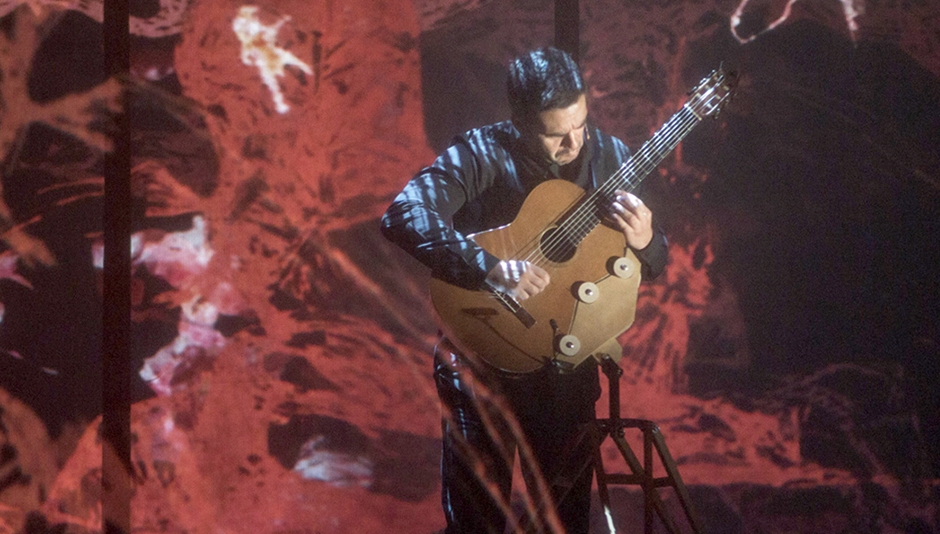“Originally, Mark was riffing on the pompous ethics of the medical, scientific and the experimental, as well as the kitschy images that come with that,” explains Chisolm. “But what I really liked about the text was that it’s ultimately about memory loss and the way that people conveniently forget or justify things in order to do what they want to do.”
He continues, “We’re looking at the idea of ethical drift; that you can move away from noble principles and are suddenly in the back shed experimenting on children. What are the psychological steps one takes to justify that? Ultimately, there is no justification and the consequences of any trauma is how you couch it within memory.”
Being such a personal and individual thing, it’s not a question that can necessarily be answered. As Chisolm states however, answering questions is not what The Experiment is aiming to do.
“One of things that interests me whilst making work is to not explain everything to an audience,” he says. “I assume that an audience is intelligent and that they’re interested in the things that I am, which is all about poetics, not necessary delivery. It’s the difference, fundamentally, between prose and poetry. I’m interested in doing the work, which is a result of collective enquiry and seeing how people respond.”
Being an experimental artist himself, it’s consequently unsurprising that the original monologue of The Experiment appealed to him and that he saw its potential for adaptation.
“I wanted to add to a set of works I’d been working on for the last decade that really look at things that people don’t necessarily want to see, in ways they wouldn’t expect,” says Chisolm. “So having a musical monodrama work that’s based on the ethics of scientific experimentation isn’t what you expect to have combined. I had an instant response to the text and there were a train of coincidences and instincts that made me think that this is what I should be doing.”
One of the fundamental differences between the original text and the collaboration is the run time. Twenty minutes to sixty is significant and undoubtedly changes the pace and tone.
“It’s certainly given it a different feel. One of the collaborators really noted that, saying that we have slowed the entire thing down,” he says. “Mark’s monologues are quite rapid fire. So we’re taking something that was originally quite declamatory, adding the music which slows everything down and allows someone to sit over the text. Things that might have sparked out before now sit in a much heavier way. It’s definitely had a transformative effect on the text and offers a very different reading to some of the very dark ideas that he looks at.”
The very title itself, The Experiment, alluded to multiple layers of meaning. As Chisolm states, the adaptation itself was an experiment for the team. “When you begin a set of experiments you have an idea and you pursue it, but there’s absolutely no guarantee that you can get there,” he says. “As artists, you want to create a work that leaves the audience with that effect. It’s super risky.”
One could also argue that the moral ambiguity of the subject matter is a thought experiment for the audience themselves. If it begins to feel as such, that’s because it was designed to do so. “There’s a suspended speaker above the audience because we wanted them to feel like they were the subjects of an experiment themselves,” he says. “Even though it is presented as the audience looking in one direction at a solo performer, we were really conscious of creating an entire environment so that when you step into it you’re in that world completely. Immersive, but not necessarily in that interactive way that immersive theatre has been like.”
Two important aspects of the piece are its connection to HIV and queer culture, both of which are notably absent from most advertisement and reviews. “Well, the text was originally inspired by a toxoplasmosis coma that Mark experienced a decade or two ago, which really shifted how he thought about identity in general,” he says. “It’s a really queer work in that sense because they’re on the hunt for this incurable disease and given that he’s overly positive and it’s a pretty queer team behind it, no one has talked about it.”
As Chisolm agrees, the success of HIV medication has in many ways, suppressed the discourse around it. “When something that is a serious illness is reduced from being a death sentence to a manageable chronic illness – which people do still die from and has a huge amount of ignorance around it – people can be blind to it,” he says. “It’s a convenience for people to not have to look at this. Any serious illness brings up issues of mortality and what it means to be a human being. [HIV] isn’t over, it’s just being experienced in a different way by people. It’s not the crisis that it was twenty of thirty years ago, but it still effects millions of people. I find it really intriguing that nobody has commented on that, nor the fact that it’s a queer work.”
BY TEGAN JONES

